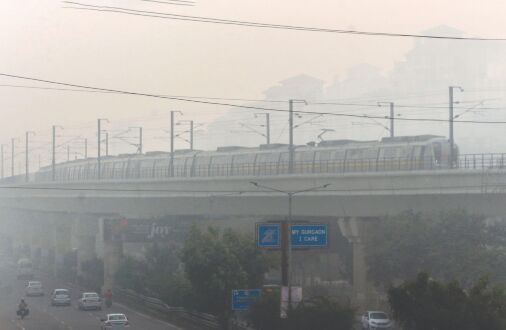Air quality still 'severe' in NCR as recovery hit by rising stubble fires

New Delhi: Three days after Diwali, the air quality in Delhi and the NCR remained in the "severe" category, with the Central Pollution Control Board recording a 24-hour average Air Quality Index of 428 as monitoring agencies blamed a sudden increase in farm fires across neighbouring states for this.
According to the Central Pollution Control Board (CPCB) data, the city's air quality index (AQI) stood at 416 (severe) at 8 pm.
Chief Minister Arvind Kejriwal continued his daily reminders to the public and to the neighbouring states on the state of the air in the Capital - in a desperate bid to get them to control the issue of stubble burning. On Sunday evening, he tweeted, "Nov 7 - AQI - 428 (401 to 500 - Severe) PM10 - 450 (Above 430 - Severe) PM2.5 - 309 (Above 250 - Severe)."
While strong surface winds had slightly helped improve the air quality in the Capital on Saturday, it had still remained in the "severe" category, with the weather office on Sunday predicting more such winds - allowing monitoring agencies to forecast an improvement in air quality by Sunday evening.
However, the real-time readings from air quality measuring stations showed that even as of 9:15 pm, at least four stations in Jahangirpuri, Wazirpur, Rohini, and Anand Vihar had recorded an AQI considered to be "hazardous".
The CPCB data showed that the AQI on Sunday at Anand Vihar was 424 ('severe' category), Okhla Phase-II 425 ('severe'), R K Puram in 'poor' category, and Rohini registered 446 ('severe'). An AQI between zero and 50 is considered 'good', 51 and 100 'satisfactory', 101 and 200 'moderate', 201 and 300 'poor', 301 and 400 'very poor', and 401 and 500 'severe'.
Since the air quality worsened on Diwali - owing to the spectacular defiance of Delhi's firecracker ban, it has remained in the "severe" category - only improving marginally every day - but its improvement being hindered by the sudden spike in stubble burning incidents across the neighbouring states of Delhi.
"Currently, AQI is still in the 'severe' category because of the large influx of stubble-related pollutants which appears to be due to much higher effective fire count observed than that assumed in the SAFAR model for forecasting," the SAFAR summary said.
In view of this, AQI is likely to improve by tonight to 'very poor' category but continue to fluctuate between the lower end of 'severe' to upper end of very poor. The favourable wind speed and direction and significantly high fire counts since yesterday, the AQI recovery is extremely slow in spite of moderate wind speed, it said.



